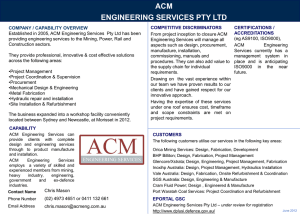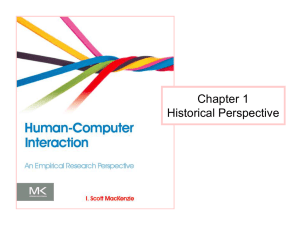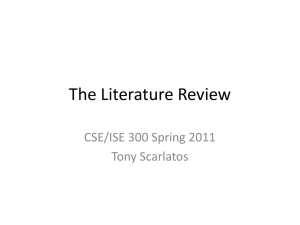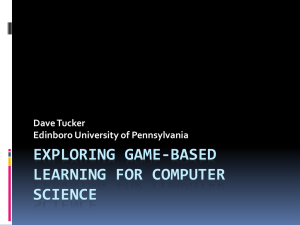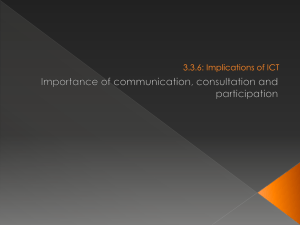Getting familiar with ACM Contest
advertisement
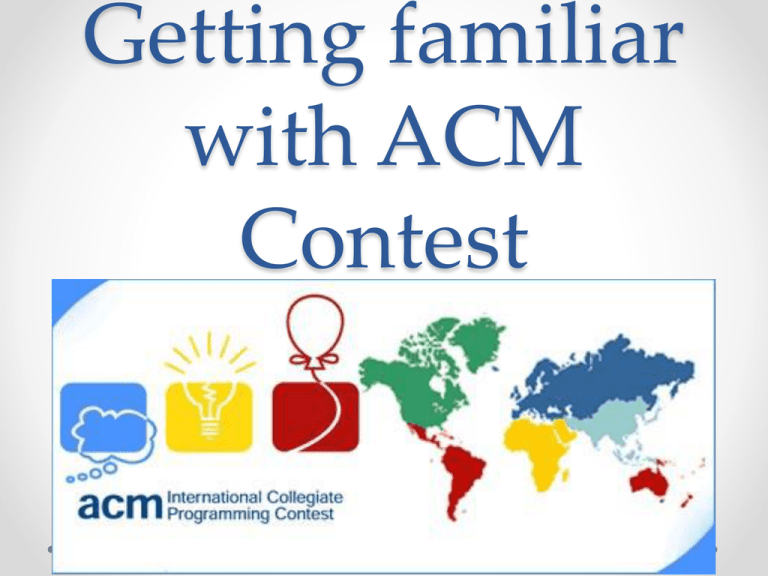
Getting familiar
with ACM
Contest
What is ACM
• ACM: Association for Computing Machinery
o http://www.acm.org/
o the world’s largest educational and scientific computing society
• ACM ICPC
o ACM International Collegiate Programming Contest
o http://en.wikipedia.org/wiki/ACM_International_Collegiate_Programming_Contest
ACM ICPC
• ICPC is a competition among teams of students
representing institutions of higher education.
o Teams compete in Regional Contests, from which top scoring teams advance to
the ACM-ICPC World Finals.
• Each team has three students, sharing one computer,
given a number of programming problems
o Coordination and teamwork are essential
ACM finals 2014
Hosted by Ural Federal University, Ekaterinburg, Russia
ACM finals 2014
Hosted by Ural Federal University, Ekaterinburg, Russia
ACM finals 2014 winners
St.Petersburg State University Team
7 problems solved / 12 problems
Cup + prizes
+ a work placement and a job offers from IBM and other companies
Programming Languages
and Judge
• You can use:
o
C, C++, Java and others such as: Python, C#
o
Feedback :
• Online Judge
• Accepted (AC) – congratulations!
• Presentation Error (PE) – Your program outputs are correct,
but are not presented in the specified format. Check for
spaces, left/right justification, line feeds, etc.
• Wrong Answer (WA) – Your program returned an incorrect
answer to one or more of the judge’s secret test cases
• Compile Error (CE) – The judge’s compiler cannot compile
your source code
• Runtime Error (RE) – Your program failed during
execution due to a segmentation fault, floating point
exception, or others.
• Time Limit Exceeded (TL) – Your program took too
much time on at least one of the test cases. Try to
improve the efficiency of your solution!
• Memory Limit Exceeded (ML) – Your program tried to
use more memory than the judge’s settings.
Available Online Judges
• Famous online judges
o
o
o
o
o
o
o
o
Valladolid OJ (http://acm.uva.es/p)
Ural OJ (http://acm.timus.ru)
Saratov OJ (http://acm.sgu.ru)
ZJU OJ (http://acm.zju.edu.cn)
ZJUT OJ (http://acm.zjut.edu.cn)
Official ACM Live Archive (http://cii-judge.baylor.edu/)
Peking University Online Judge (http://acm.pku.edu.cn/JudgeOnline/)
Programming Challenges (http://www.programming-challenges.com)
To get ready some
suggested Books
• Art of Programming Contest (free online)
o http://onlinejudge.uva.es/p/Art_of_Programming_Contest_SE_for_uva.pdf
• Thomas H. Cormen, Charles E. Leiserson, Ronald L.
Rivest, and Clifford Stein, Introduction to Algorithms, 2nd
Edition, The MIT Press, 2001.
• Robert Sedgewick, Bundle of Algorithms in Java, Third
Edition (Parts 1-5), 3rd Edition, Addison-Wesley
Professional, 2003. (There is also a C++ version).
• Donald E. Knuth,The Art of Computer Programming,
Volume 1, 2, 3.
Subjects
• You should be familiar with:
o
o
o
o
o
o
o
o
Data Structure
Strings and Sorting
High precision arithmetic
Combinatorics and number theory
Divide and conquer & backtracking
Dynamic programming
Computational geometry
Scientific computing
Standard in ACM contest
• Input/Output
o each program must read the test data from the standard input and print the
results to the standard output
• For C language, use scanf() and printf()
• For C++, use cin and cout
o scanf() and printf() are also supported
• For Java, refer to http://www.programmingchallenges.com/pg.php?page=javainfo
o Programs are not allowed to open files or to execute certain system calls
Not nice for debugging
#include <stdio.h>
int main ()
{
freopen(“FILE_NAME_FOR_INPUT”,”r”,stdin);
freopen(“FILE_NAME_FOR OUTPUT”,”w”,stdout);
Rest of the codes…
return 0;
}
While sending your code to online judges,
remember to remove the two lines with freopen.
Things to avoid
• Avoid the usage of the ++ or -- operators inside
expressions or function calls
• Avoid expressions of the form *p++
• Avoid pointer arithmetic. Instead of (p+5) use p[5].
• Never code like : return (x*y)+Func(t)/(1-s);
o but like :
• temp = func(t);
• RetVal = (x*y) + temp/(1-s);
• return RetVal;
Things to avoid
• Naming
o Don’t use small and similar names for your variables. Use descriptive
names.
o Don’t use names like {i,j,k} for loop control variables. Use {I,K,M}.
o It is very easy to mistake a j for an i when you read code or “copy, paste &
change” code,
Nature of problems to
solve
• Data structure problems
• Algorithms
o To solve real problems efficiently
• Categories:
o Sorting
o Searching
o Graph algorithms
o Scientific computing: matrix, number-theoretic,
computational geometry, etc.
-etc
• Mathematics
o Everything finally goes back to mathematics!
o Number theory
o Geometry
o Combinatorics
o Graph theory
o …
Good Team
• Knowing your strength and weaknesses
• Knowledge of standard algorithms and
the ability to find an appropriate algorithm
for every problem in the set;
• Ability to code an algorithm into a working
program;
• Having a strategy of cooperation with your
teammates
Tips & tricks
• Brute force when you can, Brute force algorithm tends
to be the easiest to implement.
• KISS: Simple is smart! (Keep It Simple, Stupid !!! /
Keep It Short & Simple).
• Hint: focus on limits (specified in problem statement).
• Waste memory when it makes your life easier (trade
memory space for speed).
• Don't delete your extra debugging output, comment it
out.
• Optimize progressively, and only as much as needed.
• Keep all working versions!
Tips & tricks
• Code to debug:
o
o
o
o
o
a. white space is good,
b. use meaningful variable names,
c. don't reuse variables, (we are not doing software engineering here)
d. stepwise refinement,
e. Comment before code.
• Avoid pointers if you can.
• Avoid dynamic memory like the plague: statically
allocate everything.
• Try not to use floating point; if you have to, put
tolerances in everywhere (never test equality)
Problem example
Source: http://acm.zju.edu.cn/onlinejudge/showProblem.do?problemCode=1001
• Time Limit:1 second Memory Limit:32768 KB
• Description: Calculate a + b
• Input:
o The input will consist of a series of pairs of integers a and
b, separated by a space, one pair of integers per line.
• Output:
o For each pair of input integers a and b you should output
the sum of a and b in one line, and with one line of output
for each line in input.
• Sample Input:
15
• Sample Output:
6
Solution
/* C code */
#include “stdio.h”
/* Java code */
import java.util.Scanner;
int main()
{
int a, b;
while (scanf(“%d %d”, &a, &b)
!= EOF) {
printf(“%d\n”, a+b);
}
return 0;
}
public class Main {
public static void main(String[] args) {
Scanner in = new Scanner(System.in);
while (in.hasNextInt()) {
int a = in.nextInt();
int b = in.nextInt();
System.out.println(a + b);
}
}
}
Set of problems that you
can train on
• Source: Fundamental
Problems
http://acm.zjut.edu.cn
1167
1166
1174
1175
1176
1177
1178
1179
1181
1185
1190
1191
1187
1204
1208
1205
1044
• Source: Fundamental
Problems
http://acm.uva.es
http://acm.uva.es/p/v1/100.html
http://acm.uva.es/p/v101/10189.html
http://acm.uva.es/p/v101/10137.html
http://acm.uva.es/p/v7/706.html
http://acm.uva.es/p/v102/10267.html
http://acm.uva.es/p/v100/10033.html
http://acm.uva.es/p/v101/10196.html
http://acm.uva.es/p/v101/10142.html

